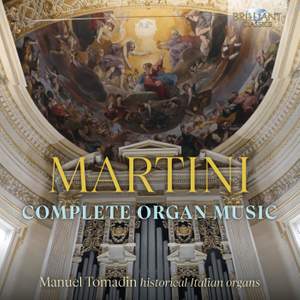A first-ever complete recording for the organ output by a pivotal figure in 18th-century music across Europe.
‘Upon so short an acquaintance I never liked any man more,’ wrote the English traveller Charles Burney, ‘and I felt as little reserve with him after a few hours conversation, as with an old friend or beloved brother.’ The young Mozart was also privileged to enjoy his friendship: ‘I never cease to grieve that I am far away from that one person in the world whom I love, revere and esteem most of all.’
They are writing of (and to) Giovanni Battista Martini (1706-1784), who was referred to at his death as ‘Dio della musica de’ nostri tempi’ – the God of music of our time. Born and raised in Bologna, he took holy orders at an early age and rarely left his home city, apparently due to poor health.
However, this cloistered lifestyle scarcely inhibited a mind of prodigious energy and industry. In 1758 he was made a member of Bologna’s most select academic society after presenting a paper (in Latin) on the use of geometry in music. Martini also wrote comprehensive manuals on counterpoint and music history, demonstrating an erudition which he passed on to many students who would become among the most noted composers of the day, among them J.C. Bach, Grétry, Jommelli, Mozart and Naumann.
His own music speaks of a lively mind, thoroughly schooled in 18th-century conventions but presenting a considerable variety of styles, doubtless informed by his scholarship. His organ output is dominated by a set of 12 Sonatas op.2, some composed as French dance suites, others as Italian trio sonatas, readily transferrable between harpsichord and organ.
Then there are many individual shorter pieces for liturgical use, to mark the Elevation of the Host, the final Blessing and the end of Mass, which Martini would doubtless have first played himself at the Bologna church where he was director of music for almost 60 continuous years. Around the specifically liturgical pieces, Manuel Tomadin arranges Toccatas, Allegros and ‘Pieni per organo’ to make nine recitals which cover the full stylistic range of Martini’s output and may be enjoyed independently of the others.
This box is the latest of Manuel Tomadin’s achievements for Brilliant Classics in reviving more or less unfamiliar figures from the Baroque era with first-ever complete editions of their keyboard music. Previous such editions have been dedicated to, among others, Hans Leo Hassler (95331), Anthoni van Noordt (95895) and Johann Ludwig Krebs (95363), and many of them have won enthusiastic reviews.
‘Yet another entry in the excellent series of recordings by Brilliant Classics of organ repertoire by little-known Italian Renaissance and Baroque masters… Manuel Tomadin has obviously become a major house organist for Brilliant Classics, which is good news, as his playing is unfailingly stylish and tasteful… The proceedings are vividly recorded; enthusiastically recommended.’ – Fanfare on Bertoldo/Borgo, 95874
Played on a variety of historic Italian organs from the 18th century



